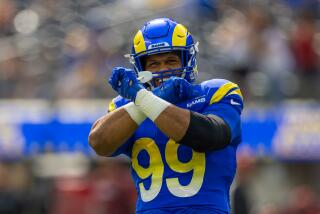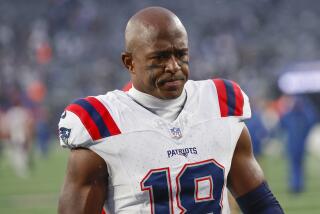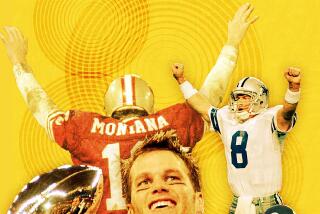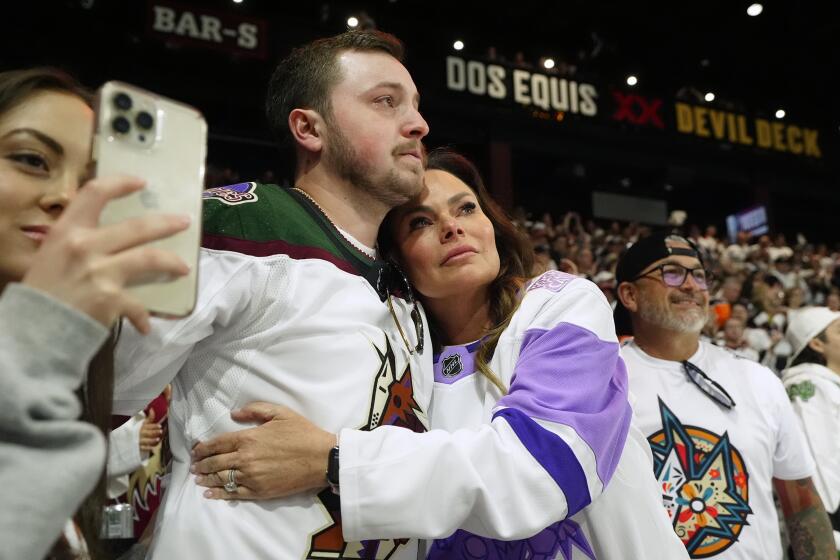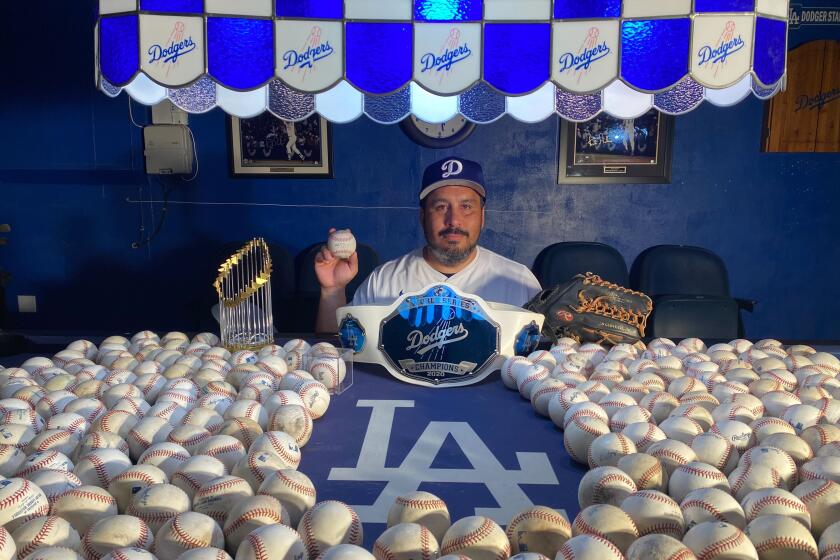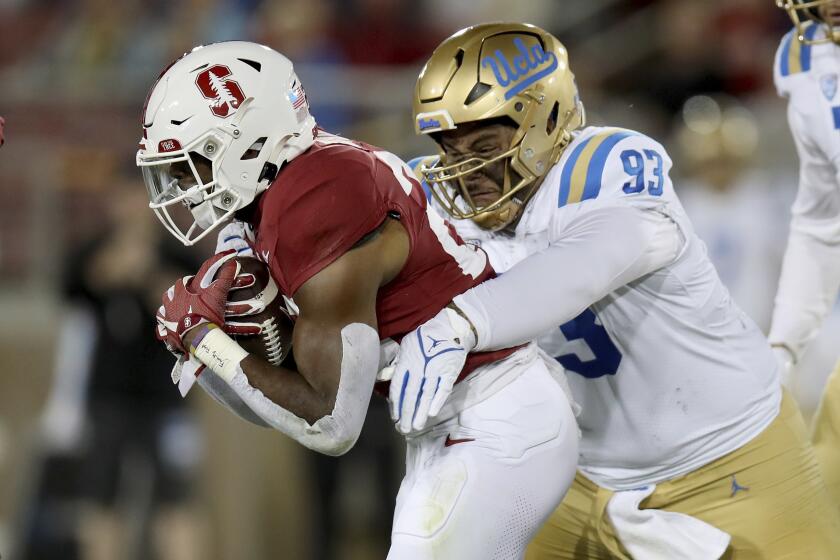No one should forget about Doug Williams
NEW ORLEANS — Just when this week’s Super Bowl celebration reaches its bourbon-fueled, Cajun-spiced peak, the football player with the most to celebrate will be leaving.
On the 25th anniversary of the game in which he became the first and only black quarterback to win a Super Bowl, Doug Williams will drive back to the northern Louisiana community where he is the football coach at Grambling State University.
“Getting up early Sunday morning, getting in the car with my wife, and just going,” Williams said.
During his brief visit to New Orleans this week, the genial pioneer did some charity work, a few radio shows, and met with old football friends who hugged him and thanked him. They always thank him. His guiding of the Washington Redskins to a 42-10 victory over the Denver Broncos in Super Bowl XXII punctured a hole in the longtime invisible barrier that prevented blacks from playing positions of intelligence and leadership. Football’s white coaching and management establishment viewed the Williams-led Redskins’ comeback victory as undeniable proof that championship qualities cannot be quantified by skin color.
Sunday’s game between the San Francisco 49ers and Baltimore Ravens will mark a wonderful anniversary for a momentous moment. It is an event that could have featured Williams in a brief pregame ceremony or coin toss or scoreboard tribute, but he will be gone, for one simple reason.
Nobody has asked him to stay.
“Maybe with Ray Lewis’ retirement, the two brothers coaching, Kaepernick playing, maybe this week NFL just had enough going on without me,” Williams said Saturday in a phone interview. “I just can’t come in there and tell them to celebrate me.”
There’s no bitterness in his voice. He has won his biggest victory. He has made indelible cultural history. He has shared a postgame moment that will never be overshadowed, a stadium tunnel meeting with his college coach, the late Grambling icon Eddie Robinson.
“We both start crying, and Coach is comparing this moment to Joe Louis knocking out Max Schmeling,” Williams remembered. “Then he told me that I would never, ever, understand the impact of what I just had accomplished until I got older, and he was right.”
It’s a shame that the NFL, where more than 60% of the players are black, couldn’t take a moment to remember it. During a winter in which all eight NFL head coaching vacancies and five general manager vacancies were filled by whites, it would have been a nice touch to give Williams one of the many New Orleans convention center rooms to hold a news conference to remind everyone of the importance of leadership diversity.
That punctured barrier has since been obliterated by the likes of Donovan McNabb, Michael Vick, Cam Newton, and Robert Griffin III. That prejudice has become so nonexistent, a coach like the 49ers’ Jim Harbaugh never blinked during the middle of this season when he replaced one of the league’s hottest quarterbacks, Alex Smith, with an untested kid of African American descent. Colin Kaepernick, of course, will start Sunday for the 49ers in attempting to be the second black quarterback to win this game.
Yet most young players are so unaware of Doug Williams’ impact, he doesn’t wear his Super Bowl ring on Grambling recruiting trips.
“If their father or mother doesn’t tell them, young African American kids don’t know me, so the ring means nothing to them,” he said.
We should all know him, this guy with the giant arm who, at age 32 and playing for his third pro team, was given the Redskins’ starting quarterback job by Coach Joe Gibbs during the playoffs despite starting just two games in the 1987 regular season. After helping the Redskins march to the final Sunday in January, Williams became the first black quarterback to play in a Super Bowl game, which might have made it the first must-win in Super Bowl history.
“I would have been a bigger story as a loser than a winner,” Williams said. “People would have said, ‘Yeah, we knew there was never a chance in hell Doug Williams could win this game.’ It would have reinforced all those years of doubts.”
Amid all this pressure, the Redskins quickly fell behind, 10-0, and Williams suffered a hyperextended knee. At which point he swallowed a couple of Advil and shrugged.
“After all I had been through to get here, I wasn’t worried,” Williams said. “I knew we had the kind of team that could win this game.”
He was certainly the kind of quarterback who could win this game. Fighting the pain, he threw four touchdown passes in a record-setting second quarter, including strikes of 80 and 50 yards, to give the Redskins a 35-10 halftime lead. Then, just to be safe, Williams climbed onto a locker-room table at San Diego’s Jack Murphy Stadium and allowed Redskins doctors to give him a painkilling injection so he could finish the game.
“It was enough pain that a lot of guys wouldn’t finish, but I had to finish,” he said.
Twenty five years later, his MVP effort still resonates.
No longer are black college quarterbacks drafted for other positions because of their color. No longer are black college quarterbacks drafted lower because they are considered bigger risks. No longer are black NFL quarterbacks called anything other than quarterbacks.
“I remember James Harris talking about how he would dream of being an NFL quarterback, then he would wake up and it would be a nightmare,” Williams said. “It’s not that way anymore. If my Super Bowl win had something to do with that, yeah, I’m proud.”
The NFL may not remember, but Williams remembered, such that this week he called five of his former Redskins teammates from that game.
“Happy anniversary,” he told them.
“No, no, happy anniversary to you,” they all responded.
Happy anniversary to us all.
bill.plaschke@latimes.com
twitter.com/billplaschke
More to Read
Get our high school sports newsletter
Prep Rally is devoted to the SoCal high school sports experience, bringing you scores, stories and a behind-the-scenes look at what makes prep sports so popular.
You may occasionally receive promotional content from the Los Angeles Times.
